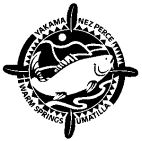
Portland, Oregon, 97232
Fax (503) 235-4228
www.critfc.org
 |
COLUMBIA RIVER INTER-TRIBAL FISH COMMISSION | |
|
729 N.E. Oregon, Suite 200, Portland, Oregon, 97232 |
Telephone (503) 238-0667 Fax (503) 235-4228 www.critfc.org |
|
| TO: | Brigadier General Strock | COE-NPD |
| Steven Wright | Acting BPA-Administrator | |
| William Branch | COE-NWD-NP - Water Management | |
| C. Henriksen, L. Beck | COE-NWD-NP-WM-RCC | |
| Doug Arndt | COE-NWD-Portland | |
| Col. Randall J. Butler | COE-Portland District | |
| J. William McDonald | USBR-Pacific Northwest Regional Director | |
| G. Delwiche, T. Lamb, R. MacKay | BPA-PG-5 and BPA-PGPO | |
| FROM: | Don Sampson, Executive Director | |
| DATE: | September 10th, 2001 | |
| SUBJECT: | Autumn 2001 Treaty Fishery ... week #3 | |
The Columbia River Inter-Tribal Fish Commission, on behalf of its member tribes the Nez Perce Tribe, the Yakama Nation, the Confederated Tribes of the Umatilla Reservation, and the Confederated Tribes of the Warm Springs Reservation, requests the following reservoir operations in Zone 6 (Bonneville to McNary dams) during the autumn 2001 Treaty fishery. Implement the following hydro-system operations during the ceremonial and subsistence Treaty fishery times as established by the Columbia River Compact and the tribes.
SPECIFICATIONS:
Implement the following operation during the ceremonial and subsistence fishery:
September 11th, 2001 6 AM, through 6 PM
September 15th, 2001
We anticipate a Treaty fishery next week. CRITFC will notify the
Corps with specific times for the tribal fishing season after the next
Compact hearing, in the form of an additional SOR.
JUSTIFICATION:
The 2001 autumn Treaty fishing season is of unprecedented importance to CRITFC member tribes. The anticipated escapement of almost 240,000 adult fall chinook will create harvest opportunities that tribal fishers have not realized in over sixty years, and many fishers will be exercising their treaty rights by participating in this harvest. Many cultural and religious ceremonies and practices will occur with the harvest of these salmon.
During a meeting at CRITFC’s Law Enforcement Division in Hood River on September 2, 1999, tribal fishers explained the impacts of unstable pools and pools below full to the Treaty fishery to Colonel Mogren and Lt. Colonel Harshbarger. The tribal fishers explained that a pool fluctuation of 1.0 foot or more disrupts tribal fishery operations (see attached diagrams). Specific problems include: (1) Increased local currents that sweep debris into fishing nets, (2) Rapid 1-2 hour drops in water level will lead to entanglement of nets, (3) boat access problems, and (4) nets torn from their anchors. Nets and gear are costly to replace: $500-$700 per net.
The fishers stressed to Corps officials that much of the tribal fishers' income and food is generated during the brief treaty fishing season. Any delays or disruptions to tribal fishing operations caused by the excessive pool fluctuations in Zone 6 negatively impacts tribal incomes, food resources and cultural practices. Tribal poverty rates are significantly higher than that of the general population, due in part to lost opportunities to harvest salmon. Under this year's low water conditions, it is critical that that pools are maintained to requested criteria to establish the best possible fishing conditions during the limited opportunity presented to tribal fishers to harvest these fish. The requested criteria should be considered a "hard constraint" and not a "soft constraint."
Implementing this request will insure that the Federal operating agencies meet their federal trust responsibilities to the Columbia Basin treaty tribes. If this SOR cannot be implemented, we request that the federal operators contact Don Sampson at CRITFC. In addition, we also request a detailed written response from the operators by September 28th, 2001.


